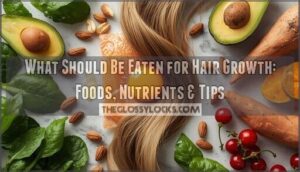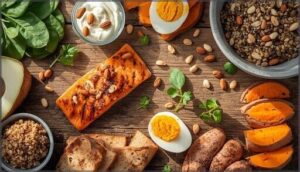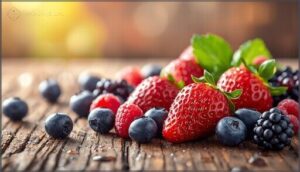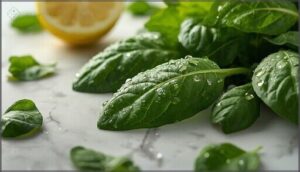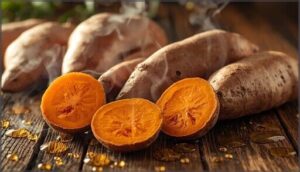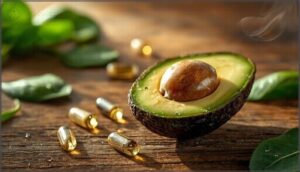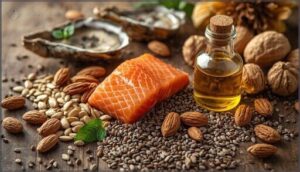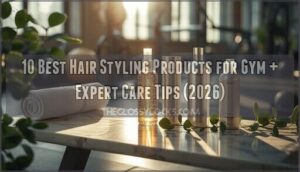This site is supported by our readers. We may earn a commission, at no cost to you, if you purchase through links.
Your hair sheds roughly 50 to 100 strands daily, and what you eat determines whether those follicles regenerate with strength or sputter out weakly.
The standard American diet, loaded with processed foods and deficient in key nutrients, starves your scalp of the building blocks it needs for resilient growth. Protein forms 80 to 85 percent of your hair’s structure, while biotin, iron, and omega-3 fatty acids regulate everything from keratin synthesis to follicle inflammation.
When you consistently miss these nutrients, your body prioritizes essential organs over your scalp, leaving strands brittle, thin, and prone to breakage. The solution isn’t expensive supplements or miracle serums—it’s rebuilding your plate with nutrient-dense whole foods that fuel follicle function from the inside out.
Table Of Contents
- Key Takeaways
- Essential Nutrients Your Hair Needs to Grow
- Best Protein-Rich Foods for Hair Growth
- Fruits and Vegetables That Promote Hair Growth
- Nuts, Seeds, and Healthy Fats
- Foods to Avoid for Optimal Hair Health
- Frequently Asked Questions (FAQs)
- What foods increase hair growth?
- What not to eat when growing hair?
- Which foods increase hair growth?
- What can I drink for hair growth?
- What foods stop hair falling?
- Which fruit is best for hair growth?
- How long until diet changes affect hair growth?
- Can spicy foods impact hair loss or growth?
- Should supplements replace food for hair health benefits?
- Does meal timing matter for optimal hair growth?
- Conclusion
Key Takeaways
- Your hair is 80-85% protein, so consistently eating eggs, salmon, lean meats, and Greek yogurt directly fuels keratin production and prevents the brittle, weak strands that come from protein deficiency.
- Iron and zinc work behind the scenes to keep follicles thriving—iron carries oxygen through hemoglobin to your scalp cells while zinc regulates oil glands and DNA synthesis, meaning deficiencies in these minerals show up as increased shedding.
- Omega-3 fatty acids from fatty fish like salmon calm scalp inflammation, strengthen follicle cell membranes, and prolong your hair’s growth phase, delivering benefits that supplements can’t match due to the selenium and B vitamins in whole fish.
- Skip the processed junk and high-sugar foods because they trigger inflammation that damages follicles, displace nutrient-rich options your hair actually needs, and disrupt gut health in ways that block nutrient absorption to your scalp.
Essential Nutrients Your Hair Needs to Grow
Your hair doesn’t grow on its own—it needs specific nutrients to build each strand, keep follicles healthy, and maintain that growth cycle you’re counting on.
If your follicles are struggling, here’s how to strengthen weak hair follicles naturally so they can support better growth.
Without the right vitamins, minerals, and proteins, your hair can weaken, thin out, or stop growing altogether. Here’s what your scalp and follicles actually need to give you stronger, healthier hair.
Protein for Hair Structure and Strength
Your hair is made up of 80 to 85 percent keratin, the structural protein that gives each strand its strength and resilience.
Hair follicles actively synthesize keratin during growth, relying on amino acids like cysteine and methionine from protein-rich foods you eat. That’s why your protein intake directly affects hair strengthening, delivering essential nutrients for thicker shafts and less shedding while maintaining nutrient balance.
Your hair needs amino acids from protein to build keratin, making protein intake essential for stronger strands and less shedding
For a deeper understanding of the importance of keratin protein and hair structure, explore how protein promotes healthy hair at every stage.
Biotin and B Vitamins for Growth
Biotin and B vitamins function as cofactors in energy metabolism that fuels follicle activity, supporting keratin synthesis at the cellular level.
You’ll find biotin in eggs, nuts, and seeds, while B12 and folate from whole grains and lean meats drive cell division for growth.
Though biotin deficiency can trigger thinning hair, most people get adequate B vitamins through balanced eating rather than hair supplements. For more details on how biotin deficiency specifically affects hair, see this biotin deficiency and hair loss resource.
Iron and Zinc for Healthy Follicles
Two minerals work quietly in the background to keep your follicles thriving: iron carries oxygen through hemoglobin to fuel healthy scalp cell growth, while zinc regulates oil glands and drives DNA synthesis in each strand. Mineral deficiency often shows up as increased shedding, so zinc balance and iron absorption matter for follicle health and sustained hair growth.
- Pair heme iron from red meat with vitamin C to boost nutrient-rich foods’ absorption
- Choose oysters and beef for highly bioavailable zinc that benefits hair follicles directly
- Avoid excess zinc, which can interfere with copper and iron, disrupting hair nutrition
- Cook in cast iron pans to gently increase iron content in your meals
Vitamins A, C, and E
Three fat-soluble and water-soluble antioxidants shield your scalp from oxidative stress while powering collagen synthesis and nutrient absorption.
Vitamin C boosts iron uptake from nutrient-rich foods, vitamin E protects hair follicle membranes, and vitamin A regulates cell differentiation—but balance matters, since excess retinol from liver or supplements can trigger toxicity and disrupt scalp health.
If you’re experiencing hair loss alongside thyroid issues, targeted treatments for thyroid-related hair loss can address both hormonal imbalances and nutrient deficiencies simultaneously.
Omega-3 Fatty Acids for Scalp Health
Your scalp craves essential fatty acids the way follicles need oxygen—EPA and DHA from fatty fish calm inflammation, strengthen cell membranes, and prolong the anagen phase for longer, resilient strands.
Omega three sources for scalp nourishment:
- Salmon and mackerel deliver 1,000–2,000 mg EPA and DHA per three-ounce serving, supporting nutrient-rich blood flow.
- Flaxseeds and chia provide plant-based ALA your body converts to active forms.
- Algal oil offers vegan DHA without mercury risk, protecting hair follicle health year-round.
Best Protein-Rich Foods for Hair Growth
Your hair is built from protein, which means loading up on protein-rich foods can give your strands the building blocks they need to grow strong and healthy.
Without enough protein, your hair growth cycle slows down, and you might notice more shedding or thinner hair. Here are the best protein-packed options to add to your plate for fuller, healthier hair.
Eggs and Greek Yogurt
Your hair thrives on protein-rich foods, and eggs deliver 6 to 7 grams of complete protein per serving, alongside biotin for keratin production.
Greek yogurt offers 15 to 20 grams of protein plus B vitamins that fuel follicle metabolism. These breakfast ideas supply essential amino acids your strands need while supporting scalp health—combine them for dietary tips that enhance nutrient-rich foods throughout your day.
Fatty Fish Like Salmon
Salmon stands out as one of the most nutrient-dense fatty fish for your follicles, delivering 20 to 25 grams of protein per 100-gram serving plus essential omega-3 fatty acids. Here’s why salmon nutrition benefits your strands:
- Omega-rich foods like salmon supply 1.0 to 2.3 grams of EPA and DHA per serving, nourishing your scalp with anti-inflammatory benefits
- Healthy fats sources aid vitamin absorption, helping your body use fat-soluble nutrients vital for hair growth
- Fish oil supplements can’t match whole salmon’s selenium and B vitamins, which fuel follicle metabolism
- Fatty acid benefits extend beyond growth, protecting follicle cells from oxidative damage while maintaining moisture
Lean Meats and Poultry
When you’re looking to fuel follicle health, lean protein from skinless poultry delivers the building blocks your strands crave. Chicken health benefits start with around 31 grams of protein per 100-gram serving of breast meat, while turkey diet options offer 29 grams with minimal fat. These meat benefits extend beyond simple protein—poultry nutrition includes heme iron for oxygen delivery to your scalp, plus zinc that aids enzyme activity linked to hair growth.
White meat portions give you protein-rich foods without the saturated fat load of dark cuts, making them smart choices for nutrition for hair growth.
| Poultry Cut | Protein per 100g | Key Hair Nutrients |
|---|---|---|
| Skinless Chicken Breast | ~31g | Iron, Zinc, B Vitamins |
| Turkey Breast | ~29g | Selenium, B12, Phosphorus |
| Lean Ground Turkey | 23–26g | Niacin, Pyridoxine, Zinc |
| Pork Tenderloin | 23–26g | Riboflavin, Iron, B Vitamins |
| Skinless Chicken Thigh | ~26g | Higher Iron, Zinc, B6 |
Cook your lean protein using grilling or baking methods to preserve amino acids, and aim for 3–4 ounces per meal to aid your hair growth cycle without overdoing saturated fats.
Legumes, Lentils, and Quinoa
If you follow a plant-based diet, legume benefits extend far beyond your gut—lentil nutrition delivers about 9 grams of protein per cooked cup alongside iron and zinc that energize follicles.
Quinoa recipes also stand out: this complete plant protein offers all nine essential amino acids your hair minerals require. These nutrient-rich foods and protein-rich foods fuel growth without cholesterol.
Fruits and Vegetables That Promote Hair Growth
Your hair follicles need more than just protein to thrive—they depend on a steady supply of vitamins, antioxidants, and plant-based nutrients that only fruits and vegetables can provide.
These whole foods deliver vitamin C for collagen production, beta-carotene for cell renewal, and healthy fats that keep your scalp nourished from the inside out. Here’s what you should be adding to your plate if you want stronger hair growth.
Berries and Strawberries for Vitamin C
Think of strawberries as your scalp’s best friend—these red gems pack roughly 89 milligrams of vitamin C per 100 grams, which promotes collagen synthesis in your follicles.
Berries deliver antioxidant properties through polyphenol riches like ellagic acid and quercetin, protecting follicle cells from oxidative damage while boosting iron absorption. That’s why nutrient-rich foods like these belong on your plate daily.
Dark Leafy Greens Like Spinach
Spinach benefits your follicles with iron that facilitates oxygen transport to hair roots, while vitamin A aids scalp conditioning through sebum production.
Dark leafy greens like kale and spinach deliver folate for rapidly dividing follicle cells, plus vitamin C that helps collagen formation around your hair roots. Pair these nutrient-rich foods with lemon juice to boost iron absorption, since cooking reduces oxalates that can block mineral uptake.
Sweet Potatoes and Beta-Carotene
Orange-fleshed sweet potatoes pack beta-carotene that your body converts into vitamin A, a nutrient essential for sebum production and hair growth.
The deeper the orange hue, the higher the provitamin A content you’ll absorb. Boiling sweet potatoes with skins on preserves up to 70 percent of beta-carotene, and pairing them with a bit of healthy fat boosts absorption of this antioxidant.
Avocados for Healthy Fats
While beta-carotene sets the stage, avocados deliver monounsaturated fats and vitamin E that protect your scalp from oxidative damage.
These healthy fats boost absorption of fat-soluble vitamins from other nutrient-rich foods you’re eating. A half avocado provides folate and biotin that support the metabolic pathways your hair follicles need, making it a smart addition to your hair growth nutrition plan.
Nuts, Seeds, and Healthy Fats
Your hair needs more than just vitamins from fruits and vegetables—it also thrives on healthy fats and minerals that keep your scalp nourished and your follicles functioning properly.
Nuts, seeds, and certain shellfish pack a powerful punch of omega-3s, vitamin E, and zinc, which work together to protect hair from damage and support the natural growth cycle. Let’s look at the best options to add to your plate.
Walnuts, Almonds, and Cashews
Your hair follicles rely on a mineral balance that walnuts, almonds, and cashews deliver in surprising ways. These nutrient-rich foods contain omega-3 fatty acids, biotin, and copper that support scalp health while protecting against oxidative stress—key factors in nutrition for hair health.
- Walnuts provide plant-based omega-3s that reduce inflammation around follicles
- Almonds offer vitamin E to strengthen hair shafts
- Cashews supply copper for melanin production
- One handful delivers 4-7 grams of protein supporting nutrient absorption
Seeds Rich in Vitamin E
You’ll find a powerful antioxidant arsenal in seeds like sunflower and sesame, which deliver vitamin E to shield follicle cells from oxidative damage.
One ounce of sunflower seeds provides roughly half your daily vitamin E requirement, while almonds and wheat germ offer similar antioxidant-rich benefits. These nutrient-rich foods also supply healthy oils and omega-3 fatty acids that nourish your scalp from within.
Oysters for Zinc Content
In terms of zinc for hair, oysters reign paramount, delivering 28 to 61 milligrams per 100 grams cooked—far exceeding the 11-milligram daily value most adults need.
This outstanding oyster nutrition facilitates protein synthesis and keratin production, both essential for hair growth. Zinc benefits your scalp health by protecting follicle cells from oxidative stress, and oysters offer highly bioavailable mineral balance alongside copper for ideal nutrient-rich foods intake.
Foods to Avoid for Optimal Hair Health
What you eat matters just as much as what you avoid in terms of maintaining healthy hair growth. Certain foods can trigger inflammation, disrupt nutrient absorption, or deprive your follicles of what they need to thrive.
Here’s what to limit or eliminate from your diet to protect your hair’s health and vitality.
High Sugar and Processed Foods
Too much sugar intake can sabotage your hair growth goals faster than you think. Processed foods loaded with hidden sugars don’t just spike your blood glucose—they trigger inflammation links that damage follicles and disrupt gut health.
Here’s what happens when you reach for that granola bar:
- Nutrient displacement – You’re missing out on nutrient-rich foods your hair actually needs
- Inflammatory response – Sugar overload increases oxidative stress that harms follicle cells
- Microbiome disruption – Your gut bacteria lose balance, affecting nutrient absorption
- Insulin resistance – Long-term exposure raises diabetes risk and weakens hair growth cycles
Making dietary changes toward healthy eating for hair growth means reading labels carefully and choosing whole foods over packaged options.
Excessive Salt and Saturated Fats
Loading your plate with salty foods and saturated fats creates a double threat to your follicles. Sodium blood pressure spikes lead to fluid retention and kidney strain, while excess fat cholesterol clogs the pathways your scalp needs for nutrient delivery.
Healthy eating for hair growth means choosing nutrient-rich foods over processed meats and fried options, supporting both nutrition and wellness through mindful food for healthy hair choices.
Foods That Cause Inflammation
Inflammatory triggers like refined carbs and processed meats activate pathways that disrupt your follicle environment, while an imbalanced omega-six intake from corn and soybean oils tilts your body toward pro-inflammatory states.
Gut inflammation from additives and excess alcohol raises systemic markers, choking nutrient delivery to your scalp. Counter this damage by prioritizing fatty fish, nuts and seeds, and berries—foods rich in omega-3 fatty acids and antioxidants that restore balance.
Frequently Asked Questions (FAQs)
What foods increase hair growth?
Think of your follicles as tiny engines running on fuel.
Protein-rich foods like eggs and salmon, nutrient-dense spinach, berries packed with vitamin C, and omega-3-loaded walnuts power healthy hair growth naturally.
What not to eat when growing hair?
Skip sugary drinks, fried foods, and processed meats—they’re loaded with refined carbs and artificial additives that trigger nutrient deficiency, worsen vitamin deficiency, and sabotage hair loss prevention through poor hair growth and nutrition.
Which foods increase hair growth?
Nutrient-rich foods like fatty fish deliver omega-3 fatty acids and protein, while eggs provide biotin for keratin formation.
Dark leafy greens, nuts, and berries supply antioxidant sources that support healthier follicles and stronger growth.
What can I drink for hair growth?
While solid foods get all the credit, what you sip matters too.
Water keeps your scalp hydrated, reducing breakage, while vitamin C drinks like amla juice and herbal teas deliver antioxidants that nourish follicles and support nutrient-rich diets.
What foods stop hair falling?
Foods rich in protein, iron, and zinc help prevent hair loss by strengthening follicles and supporting growth cycles.
Fatty fish, eggs, spinach, and legumes deliver nutrients that reduce shedding when consistently included in nutrient-rich diets.
Which fruit is best for hair growth?
Think of your hair follicles as tiny factories that run on premium fuel—berries, citrus fruits, and papaya benefits deliver that power through vitamin C, antioxidants, and nutrient-rich foods that strengthen every strand.
How long until diet changes affect hair growth?
Your follicles usually respond within two to three months after you boost protein, iron, and vitamins.
Expect visible regrowth around the scalp edge during that period as nutrient-rich foods support healthier hair.
Can spicy foods impact hair loss or growth?
While capsaicin benefits scalp circulation temporarily, spicy food effects on hair growth patterns remain minimal.
However, excessive heat can trigger scalp irritation in sensitive individuals, potentially worsening inflammation-related shedding—moderation matters here.
Should supplements replace food for hair health benefits?
No, supplements can’t replace a balanced diet for hair health.
Whole food benefits include nutrient synergy, better absorption, and dietary balance that isolated vitamins and minerals for hair simply can’t match.
Does meal timing matter for optimal hair growth?
Your body operates on cycles—hair growth included.
Distributing protein, nutrient-rich foods, and macronutrient balance across meals every 3-4 hours promotes steady keratin synthesis, follicle oxygen delivery, and dietary rhythms that align with your hair cycle.
Conclusion
Hair growth isn’t a root cause mystery—it’s a direct response to what should be eaten for hair growth, plain and simple.
When you consistently stock your plate with protein-rich eggs, omega-3-loaded salmon, iron-dense spinach, and biotin-packed nuts, you’re feeding follicles the exact compounds they need to manufacture resilient strands.
Skip the processed junk, prioritize nutrient density, and your scalp will reward you with thicker, stronger hair that doesn’t quit.
- https://www.gov.uk/government/publications/sacn-review-of-dietary-advice-on-vitamin-a
- https://pubmed.ncbi.nlm.nih.gov/25573272/
- https://www.ncbi.nlm.nih.gov/pmc/articles/PMC6380979/
- https://karger.com/sad/article/3/3/166/291279/A-Review-of-the-Use-of-Biotin-for-Hair-Loss
- https://ods.od.nih.gov/factsheets/Biotin-HealthProfessional/

